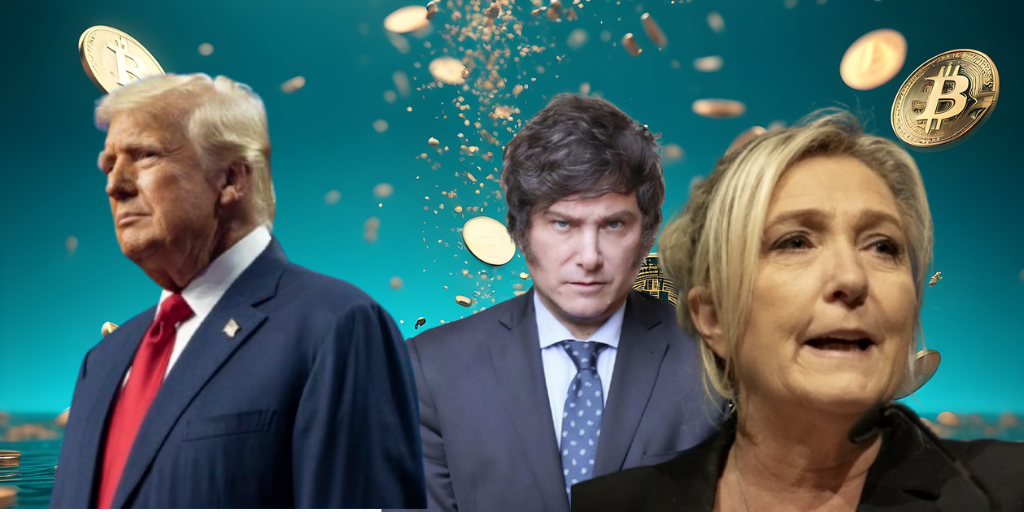From Skepticism to Embrace: How Politicians Are Turning to Crypto

 by Sophie Lejeune -
Published on 13 March 2025 10:12 GMT
by Sophie Lejeune -
Published on 13 March 2025 10:12 GMT
Not long ago, cryptocurrency was seen as a niche interest, primarily discussed in tech circles and libertarian communities. But today, the tide is shifting. From the United States to Europe and Latin America, high-profile politicians are increasingly engaging with crypto—not just as a technological curiosity, but as a political and economic tool.
Figures such as Donald Trump, Javier Milei, and Marine Le Pen have all made statements or policy moves regarding digital currencies. Whether driven by ideological alignment, voter appeal, or economic pragmatism, this trend reflects crypto’s growing influence in global politics.
Trump’s U-Turn: From Critic to Crypto-Friendly
Former U.S. President Donald Trump was once a vocal skeptic of cryptocurrency, calling Bitcoin a "scam" and dismissing it as a tool for illicit activities. However, during his 2024 presidential campaign, Trump has softened his stance. Reports suggest he holds Ethereum-based NFTs, and he has started appealing to the growing crypto-friendly voter base.
His shift reflects a broader change within the Republican Party, where candidates increasingly view crypto as an issue of financial freedom. In contrast, the current Biden administration has taken a more regulatory-heavy approach, leading to frustration within the industry. If Trump returns to office, many believe he could reverse some of the more stringent crypto regulations imposed under Biden’s SEC.
Javier Milei: A Libertarian Embrace of Bitcoin
Nowhere is the political embrace of crypto more apparent than in Argentina, where President Javier Milei has made his libertarian vision clear. A strong critic of central banking, Milei has spoken positively about Bitcoin as a tool for economic freedom.
While Argentina has not officially adopted Bitcoin as legal tender (unlike El Salvador), Milei’s government has deregulated many aspects of the economy, creating a more crypto-friendly environment. Given Argentina’s long history of inflation and currency devaluation, crypto’s appeal to the public—and its potential role in policy—remains strong.
Marine Le Pen: A Shift in the European Right?
In France, far-right leader Marine Le Pen has not historically been a vocal supporter of cryptocurrency. However, like other populist politicians, she has capitalized on the theme of economic sovereignty. While her stance remains more cautious than that of Milei or Trump, Le Pen’s party has positioned itself as a critic of the European Union’s regulatory approach to digital assets.
Her opposition to centralized European financial control aligns with the broader Euroskeptic movement, which often finds common ground with crypto advocates who distrust centralized authorities. If Le Pen were to gain power, France’s crypto landscape could shift in a more favorable direction.
A Global Trend: Politicians Embracing Crypto
Beyond these high-profile figures, many politicians worldwide are integrating crypto into their platforms. In El Salvador, President Nayib Bukele became the first head of state to make Bitcoin legal tender, making crypto a core part of his governance model. In the United States, Robert F. Kennedy Jr., an independent presidential candidate, has positioned himself as pro-Bitcoin and an opponent of central bank digital currencies (CBDCs). Meanwhile, in Canada, Pierre Poilievre, the leader of the Conservative Party, has actively promoted Bitcoin as a hedge against inflation and government overreach.
These politicians, while ideologically diverse, share a common theme: crypto as a tool for financial independence, resistance to centralized control, and appeal to younger, tech-savvy voters.
The Future: Will Crypto Shape Political Platforms?
As crypto adoption increases, so does its political relevance. In the coming years, debates over regulation will likely intensify. Some governments may push for stricter controls, while others will champion deregulation to attract investment and innovation. At the same time, crypto will become an increasingly important issue in political campaigns, with candidates using it to connect with younger, libertarian, and tech-focused voters.
Beyond rhetoric, real policy shifts could shape the future of crypto at the national level. Countries that embrace digital assets may see a surge in investment and technological growth, while those that impose heavy restrictions risk driving innovation elsewhere. What was once a fringe topic has now entered the mainstream of political discourse. Whether through advocacy, regulation, or direct adoption, crypto is no longer just about technology—it’s about power, governance, and the future of finance.

 by Sophie Lejeune -
Published on 13 March 2025 10:12 GMT
by Sophie Lejeune -
Published on 13 March 2025 10:12 GMT